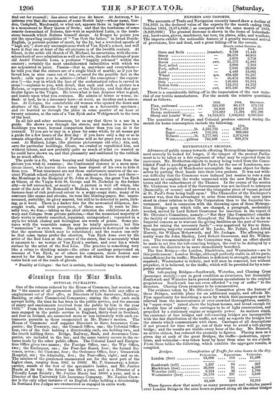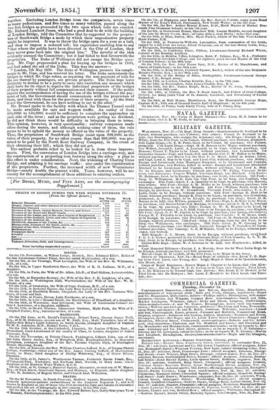METROPOLITAN BRIDGES.
Advances of public money towards effecting Metropolitan improvements need scarcely be looked for longer, if the temper of the present Parlia- ment is to be taken as a fair exponent of what may be expected from its successors. Mr. Brotherton objects to money being voted from the Conso- lidated Fund to purchase ground for Parks for the use of Londoners, see- ing that the people of Manchester accomplish the same object for them- selves by putting their hands into their own pockets. It was not with- out difficulty that the Commons were induced last session to vote a sum necessary to complete the works connected with the new Bridge at Bat- tersea and the embankment of the Thames. In the course of the session Mr. Gladstone was asked if the Government was not inclined to interpose (financially, of course) and prevent the triangular piece of vacant ground at St. Paul's from being built upon ? The Chancellor of the Exchequer's answer was, that the advantages to arise from retaining the open space stood in closer relation to the City Corporation than to the Imperial Go- vernment. And in connexion with the throwing open of those Metropo- litan Bridges upon which tolls are charged, a paragraph, moderately worded, moved by Lprd Robert Grositenor for insertion in the report of Mr. Oliveira's Committee, namely-" But they (the Committee) consider the facility of communication throughout the Metropolis to be so far an Imperial concern as to warrant the giving facilities on the part of Govern- ment for raising the necessary funds "-was negatived by five to three. The opposing majority consisted of Mr. Locke, Mr. Pellatt, Lord Alfred Hervey, Sir William Moleeworth, and Mr. Jackson. The affirming mi- nority were Sir John Shelley, Lord Robert Grosvenor, and Mr. Wilkin- son. The recommendation of the Committee was, that an effort should be made to set free the toll-exacting bridges, the cost to be defrayed by a rate over the districts to be more immediately benefited.
The free Bridges-the London, Blackfriars, and Westminster-are in this predicament : London Bridge, although perfectly stable in all its parts, isinsufficient for its traffic ; Blackfriars is deficient in strength, and must be repaired ; Westminster is rickety, and will soon be removed, but without prejudice, it is believed, to the traffic, which will be provided for by a tem- porary structure. The toll-paying Bridges-Southwark, Waterloo, and Charing Cross (passenger merely)-are in good condition as structures, but financially Southwark and Waterloo have proved ruinous speculations to the original proprietors. Southwark has not even afforded "a cup of coffee" to the directors. Charing Cross promises to be remunerative. The evidence taken by Mr. Oliveira's Committee gives the history of these Bridges, unfolds plans for an additional supply, and affords Mr. Pyre opportunity for describing a mode by which foot-passengers may be relieved from the inconvenience of over-crowded thoroughfares, namely, by "super-ways " raised above the highest houses, and broad enough for a double line of railway ; the carriages to be of light construction, and propelled by a stationary engine or magnetic power. As matters stand, the existence of free bridges and toll-exacting bridges are incompatible with the fair distribution of the traffic, not only as regards the bridges but the streets which communicate with them. Carriages of all descriptions if not pressed for time will go out of their way to avoid a toll-paying bridge ; and the results are visible every hour of the day. Mr. Bennoch, an active citizen, has reduced the anomaly to figures. Placing men on a given day at each of the great Bridges, the traffic-pedestrian, eques- trian, and vehicular-was taken hour by hour from nine to six o'clock. From these tables the following, which exhibits the aggregate results, is compiled. Bridges. Classification of Traffic for nine hours in the day.
Pedestrian. Equestrian. Vehicular.
London (free) 63,080 114 .... 11,498 Southwark (toll) 1,357 93 307 Blackfriars (free) 30,089 91 4,359 Waterloo (toll) 6,231 35 1,709 Westminster (free) 26,170 297 5,840 63,850 516 12,215 These figures show that nearly as many passengers and vehicles passed over London Bridge in the nine hours as passed along all the other bridges together. Excluding London Bridge from the comparison, seven times as many pedestrians, and five times as many vehicles, passed along the two free bridges as proceeded by the Mb upon which tolls are exacted. Mr. Richard Lambert Jones, who had a good' deal to do with the building of London Bridge, told the Committee that he suggested to the proprie- tors of Southwark Bridge a mode by which their unproductive property might be improved. It was to throw the bridge open for a year as a bait, and then to impose a reduced toll ; his experience enabling him to say "that where the public have been diverted in the City of London, they have never gone back into the original line." The novelty of the idea evidently amused the Committee ; but it had failed to find favourwith the proprietors. The Duke of Wellington did not escape the Bridge ques- tion. Mr. Cope propounded a plan for buying up the bridges in 1839, and had asked the aid of the Duke. This was the answer-
" London, 7th May 1839. The Duke of Wellington presents his compli- ments to Mr. Cope, and has received his letter. The Duke understands the bridges to which Mr. Cope refers, as requiring the non-payment of tolls for the use thereof by passengers, are private property. The Duke begs leave distinctly to decline to be a party to carry into execution any measure which shall have for its object to deprive the individual proprietors of the bridges of their property without full compensation and their consent. If the public require the accommodation of having the use of the bridges without the pay- ment of toll, the Government should communicate with the proprietors of them, and treat with them for the purchase of their property. As the Duke is not the Government, he can have nothing to say to the affair."
Mr. Brunel spoke to the facility with which the Thames Tunnel could be made available for cart and waggon traffic. An outlay of from 100,0001. to 150,0001. would be sufficient to complete the approaches on each side of the river ; and as the proprietors were getting no dividend, he did not think there would be difficulty in bringing them to terms. This opinion, however, is very questionable : railway companies made offers during the mania, and although nothing came of them, the rule seems to be to uphold the money so offered as the value of the property. Thus, the proprietors of Southwark Bridge insist upon 300,0001. as the value of their property, for no other reason than that 300,000k was pro- mised to be paid by the North Kent Railway Company, in the event of their obtaining their bill ; which they did not get.
The earliest probable relief to be looked for is from three improve- ments. First, the conversion of London Bridge into a carriage-way, and the construction of a projecting iron footway along the sides : a plan to this effect is under consideration. Next, the widening of Charing Cross Bridge, and adapting it for carriage traffic : also under the consideration of the proprietors. Further, the increased width of new Westminster Bridge-nearly double the present width. Years, however, will be ne- cessary for the accomplishment of these additions to existing outlets.



































 Previous page
Previous page